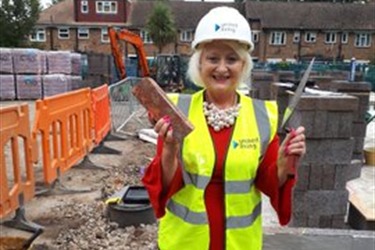
Barely a single week goes by without a normal, hardworking family in my constituency being evicted from their privately rented property and sent to temporary accommodation miles away from their family, their schools, their jobs. They join over 83,700 households across our country, including 124,000 children, who are living in temporary accommodation, costing the taxpayer a staggering £1 billion every year. Every single penny badly spent.
Other families who come to see me are on the ever-expanding housing waiting list, with 1.2 million families across our country now waiting for a place to call home. 1.2 MILLION! What was the Government’s response? Just 6,464 new social homes in 2017-18, the second lowest on record, at a rate that would take 172 years to give everyone on the current waiting list a social rented home.
Of course, many try to privately rent. But this market simply does not work for those on benefits when the vast majority of privately rented homes are unavailable to them. Some do secure a private tenancy but the reality can often be overcrowded conditions at rents that leave them with little to live on and some without
enough to eat.
Finally, there are those fortunate enough to make it on to the housing ladder. When I became an MP in 1997, it took until just the age of 26 for more than half of the population to own their own home. Now even the Bank of Mum and Dad can’t prevent it taking until the age of 34 for the majority of those to make it on to the housing ladder. Why? Because average house prices have skyrocketed by more than 270% in the last two decades, pushing homes completely out of reach for so many. In fact, the average house now costs an extraordinary 7.8 times average annual earnings, compared to 3.6 times earnings in 1997.
Our country’s housing target is 300,000 new homes per year, a figure that hasn’t been reached since 1969 – back when Councils and Housing Associations were building new homes. That means that England is now on course for its worst decade for housebuilding since the Second World War. We are, quite simply, in the grips of a housing crisis.
Yet, in the last financial year, just 86,685 homes were completed by the ten FTSE 350 housebuilding companies, despite an extraordinary collective pre-tax profit of over £5.37 billion! Meanwhile, these four companies are currently sitting on a land bank of over 300,000 plots between them!
I have no qualms about those at the top being paid well. I’m not calling for a salary cap or for a widespread cut to Chief Executives pay. If a housebuilding company is doing a good job, using their land and building the homes that we are so desperate for then of course those in charge deserve to be paid well. But the simple statistical proof of their performance is that they are not.
In the heart of our country’s housing crisis, the four FTSE 100 housebuilding companies spent an eye watering £53.2 million on their CEO pay. Surely high pay is supposed to be about high productivity, high quality of product. Yet it seems to me that the more substandard the properties that they build and the lower their rate of productivity, the more that they seem to get paid. There seems to be no consequence to poor performance. We are in a housing crisis. Is it really appropriate to provide such preposterous pay packages considering the housebuilding record that I have described today?
And these pay packages are reserved for the few at the top of the tree. The median pay for FTSE 100 housebuilding CEO’s is a staggering 228 times that of a typical UK construction worker. 228 times! At Barratt, the ratio is a disappointing 113:1. At Taylor Wimpey it is an awful 126:1. At Berkeley it is a despicable 333:1. But at Persimmon it is an absolutely deplorable 1561:1!!
But this vast scale of inequality looks even worse in light of UK house prices. Assuming the average UK house price is £230,630 and that the average UK construction worker saves 10% of their earnings for buying a house, it would take them 92 years to save up – and 19 years just to save for the deposit alone! But the average FTSE 350 CEO could buy 28 houses outright in 1 year, 532 houses over the 19 years that the construction worker is saving for their deposit and 2,567 houses over the 92 years that they are saving up to afford their home!
Now I am in no position to prescribe what the highest acceptable pay ratio is. But there can surely be no doubt in anyone’s mind that these ratios are utterly unacceptable, unjust and unfair.
In the heart of our housing crisis, it’s clear to me that the British housebuilding industry is not only failing to
provide the homes that our country so desperately need, but it has also failed to get its own house in order.
Click here to
read more about this issue and my debate on it in the House of Commons.